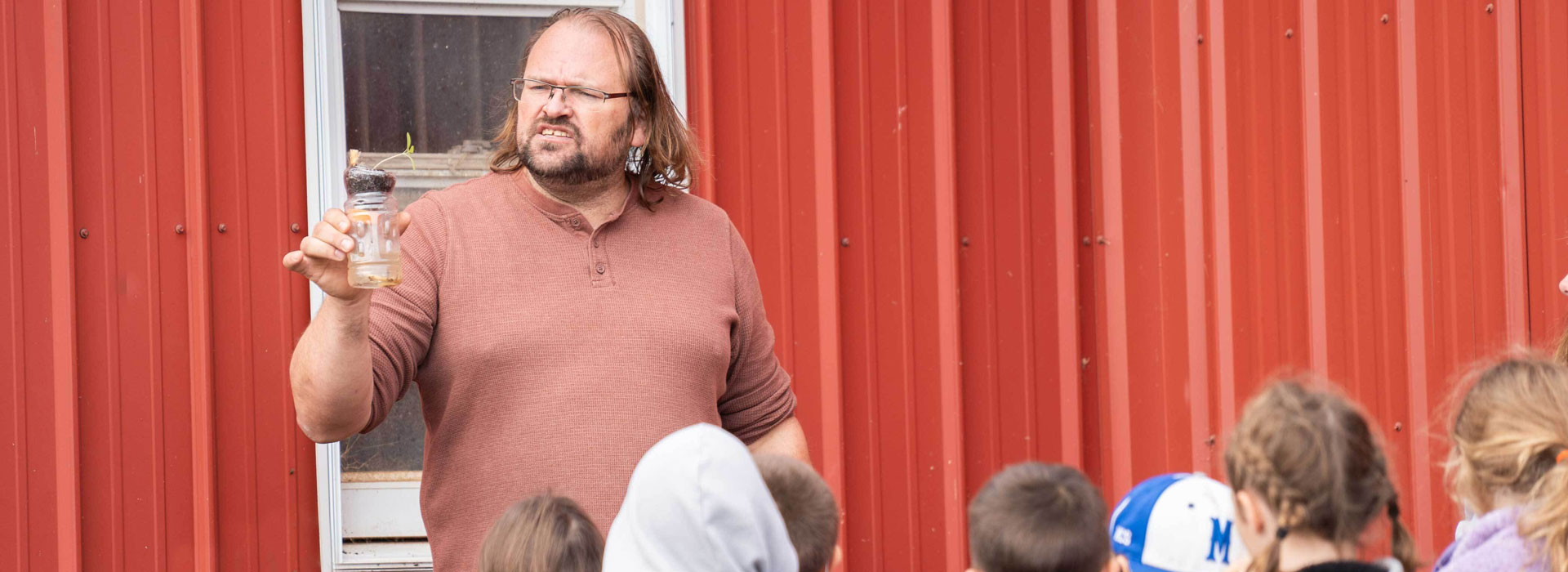It was a day to learn all things agriculture! And there was plenty to learn about from horses, aquaculture and dairy, to maple syrup and soil science.
Twenty-five booths were part of this year’s Ag Day at SUNY Morrisville, which attracted nearly 500 participants, including students from Hamilton, Madison, Stockbridge Valley and Morrisville-Eaton’s agriculture programs.
Fond memories brought local teachers and alumni Phil Keville and Rebecca Werbela back to campus to participate with their students and give back to the college that kick-started their careers in agricultural education.
Keville, an agriculture and technology teacher at Madison Central School set up an attention-grabbing booth — an aquaculture tank filled with giant goldfish. Next to it was a small tank of axolotls, an exotic-looking, endangered aquatic salamander.
While students gathered around the tank, gasping at the size of the colorful goldfish, Keville, described their history, life span and the significance of water quality in their tanks.
“I am showing them the importance of why we need aquaculture,” said Keville, ’18, ’21, who learned that firsthand as a graduate of SUNY Morrisville’s aquaculture associate degree and environmental & natural resources management bachelor’s degree programs.
Keville’s love for agriculture spawned into a teaching career at Madison Central School, where he recently started his own classroom aquaculture program.
As a student, his special project working with seahorses in the college’s lab carried over into his present classroom, where a tank of seahorses, donated by the college’s aquaculture & aquatic science program, are giving students a glimpse into the rarest life cycle: seahorses are among the few species where the male carries the offspring and gives birth.
Other tanks are filled with guppies, molly fish and axolotls.
Keville’s aquaculture program is modeled after SUNY Morrisville’s aquaculture & aquatic science program. So is his teaching method.
“Just like when I was at Morrisville, I instill as much hands-on as I can in my classroom, something I truly valued as a student,” Keville said.
Similar to Keville, SUNY Morrisville ignited Rebecca Werbela’s love for agriculture and spearheaded her teaching career. Werbela ’04, a teacher at Morrisville-Eaton Middle-High School, launched an agriculture program that is thriving under her leadership.
It is the fifth year Werbela has brought her students to the college’s Ag Day event. This year, she teamed up with Stockbridge Valley to host a maple syrup booth.
“The day gets my students to see what agriculture is,” Werbela said. “This is great outreach for kids who don’t have ag programs in their school.”
Her support for SUNY Morrisville doesn’t stop at Ag Day. Werbela’s students are also part of the college’s Earth Day celebration and participate in trout spawning at the college’s aquaculture center, along with professors in the aquaculture & aquatic science program.
Her students also teamed up with the college’s Horticulture Department to build four raised garden beds at Morrisville-Eaton Middle-High School.
“I would not be here today without my Morrisville degree and experience,” Werbela said. “I want my students to see how valuable their education is and I want to be able to give them a glimpse into the many careers agriculture education has to offer.”
Ag Day provided more than a glance of them, including a booth where participants learned all about where our food comes from (seeds) and the components of soil. Arranged by Jen Gilbert Jenkins, associate professor of agricultural science and her students, participants had the chance to roll up their sleeves and actually get their hands dirty touching different types of soil.
Trevor Parkinson, an agricultural science student who was assisting at the booth, knows all about the importance of applied learning, one of the reasons why he chose SUNY Morrisville.
“I love its hands-on approach and small classrooms,” he said. He’s gaining skills in a lot of areas, which will help toward his goal to be an agronomist.
Horses from the college’s equine programs were an additional attraction of the day, as well as goats from the livestock management specialty track in the college’s new agricultural science bachelor’s degree program.
A booth manned by professor Bill Snyder and students from the college’s Conservation Tri-Society utilized skulls, tracks and furs, in hands-on fashion, to teach participants how to identify animals.
The event, which was free and open to the public, also featured hayrides by the Ag Engineering Club and an exhibition by the college’s Woods Sports Team.

